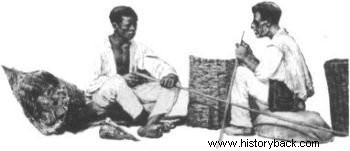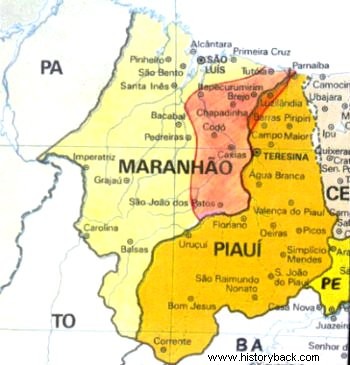The Balayada was a popular struggle that took place in the province of Maranhão during the years 1838 and 1841.
The revolt emerged as a social uprising for better living conditions and had the participation of cowboys, slaves and other disadvantaged people.
The name of this popular struggle comes from the "balaios", the name of the baskets made in the region.
Main Causes

Slaves weaving baskets
The main causes of Balaiada are linked to the poverty of the population of the province of Maranhão, as well as their dissatisfaction with the political excesses of the large landowners in the region.
These fought for political hegemony and did not care about the misery of the population, which still suffered from injustices and abuse of power by the authorities.
That political elite was divided between two parties:
- Bem-te-vis :liberals, who indirectly supported the balaios at the beginning of the revolt;
- Cabanos: conservatives, who were against the balaios.
While the two parties struggled for power in the province, the economic crisis was exacerbated by competition from American cotton. This caused an unsustainable situation between the elites and the poor.
Despite this situation, the ruralists instituted the “Mayors' Law”. It allowed the appointment of mayors by the governor of the province and caused several outbreaks of revolt, giving rise to the Balaiada.
The Revolt

Map of the fights that took place in Balaiada
We already know that the Balaiada lacked firm leadership. However, some figures stood out in the uprising, especially for their ability to undertake guerrilla strategies against imperial forces.
One of the most prominent leaders was also the one who sparked the Baliada revolt.
When his brother was arrested in Vila da Manga, the cowboy Raimundo Gomes and his friends attacked the village's public jail. They freed all prisoners on December 13, 1838, taking a considerable number of arms and ammunition.
At the same time, artisan and basket maker Manoel dos Anjos Ferreira , takes matters into his own hands after a soldier dishonors his daughters.
Furious and determined, he assembles an armed band and attacks several villages and farms in Maranhão. Then, these leaders group together and join a third commander:the black Cosme Bento de Chagas , quilombola and military chief of approximately 3,000 blacks.
In 1839, after a period of victories, in which some important villages were captured, such as Vila de Caxias and Vargem Grande, the insurgents established a Provisional Junta.
However, the movement began to show signs of weakening after the death of Manoel dos Anjos, known as Balaio, who was hit by a projectile during one of the conflicts.
In the same year, the ex-slave Cosme assumes the leadership, who withdraws from the combat and takes his forces to the sertão.
Final Battle
The situation of the rebels worsened even more when the experienced military, Colonel Luís Alves de Lima e Silva (future Duque de Caxias ) assumes command of all troops in Maranhão, Piauí and Ceará. The troops consisted of more than 8,000 well-armed men on February 7, 1840.
Not without effort, the Colonel defeats Raimundo Gomes, who, surrounded and isolated, surrenders and surrenders Vila de Caxias to the official troops. It's the beginning of the end.
In 1840, the newly crowned Emperor Dom Pedro II decided to give amnesty to rebels who surrendered. Immediately, more than 2,500 baskets surrender.
With that, Luís Alves de Lima e Silva definitively crushed those who continued fighting in 1841. In the same year, Cosme Bento was captured and hanged. In turn, the cowboy Raimundo Gomes is expelled from the province and dies on the way to São Paulo.
Upon returning victorious to the capital, Colonel Luís Alves de Lima e Silva received the title of Baron of Caxias, for having quelled this social revolt.
Curiosity
Currently, in the municipality of Caxias, there is the Balaiada Memorial, entirely dedicated to the history of the rebellion.
Read more:
- Regency Period
- Cabanage
- Sabinada
- Male Revolt
- Maranhão
- Brazil Empire
- War of the Rags
